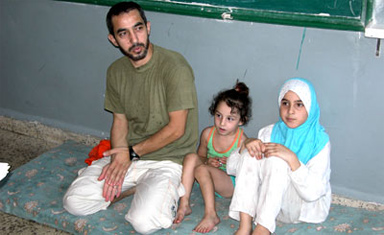People are still fleeing the shelling in the South: today one in five Lebanese is homeless

Photo : EC/ECHO/Daniela Cavini
BEIRUT. “How do you explain bombing to children?’ Sitting on his mattress in the classroom where he and his family have spent the last ten days, Imad Alawieh hugs his eight year old daughter.
We are in Sin El Fil, a heavily populated northern suburb of Beirut. It is a mainly Christian area but doors have been opened for Shiite families fleeing the shelling. So far, the solidarity between communities is still working and the massive response from Lebanese society has allowed the country to cope with this tragedy.
People are still fleeing the shelling in the south, if they can. Today, almost one in five Lebanese is homeless. In this small school, 20 families have so far found refuge. “We are already overcrowded – explains Elie Sarkis, the school’s principal – and can’t fit anyone else in. We do everything we can; we get help from World Vision while the Lebanese Red Cross mobile team comes to check on health conditions. A private association offers the daily dinner. But I’m worried for the future.”
” I’m originally from the South; from the area where the fighting is heaviest,” recounts Imad. “All my family and friends are there but I have lived for many years in Southern Beirut. I’m an electrician and used to work for a company here in the city. A month ago, I resigned to start up my own business. Bad timing!”
Imad shakes his head and lapses into silence. He must be wondering how he will provide for his family once all of this is over. Then he takes up his story again. “I couldn’t believe it w hen the bombing started. I thought it must be a mistake. Our apartment is near the airport and after two days, my children couldn’t cope any more. They were terrified, they didn’t eat and couldn’t sleep. We were afraid we might also be targeted, so we decided to leave. All of our neighbours did the same. The apartment was fine when we left but now I don’t know.”
“We moved first to a friend’s house, but he lives next to an army barracks, so we decided to flee again. I didn’t really know where to go. We spent one night inside the car, just to get away from the danger. It was so chaotic and you cannot think clearly in such a situation. Some people told me about this place, so here we came.”
In Sin El Fil, Imad and his family moved into the classroom. He found food, water and toilets – but no shower. He listens to the radio all day long. As he speaks, his youngest daughter – 18 months old – toddles around playing with chairs and smiling to the world.
“It’s breaking my heart. In this country we know the bitter taste of war. I want to protect my children. I want them to grow up without fear, not like my generation. I also think about my family in the south, my relatives. One of my cousins died, but then I lost contact, I have no information about the others.”
” I couldn’t find words to explain the war to my children. I don’t want them to start hating. I told the little ones not to worry, that everything will be OK soon. But what about the older ones. They watch TV and read newspapers. How can you keep the war away from them?”
Daniela Cavini
ECHO Regional Information Officer – Amman

